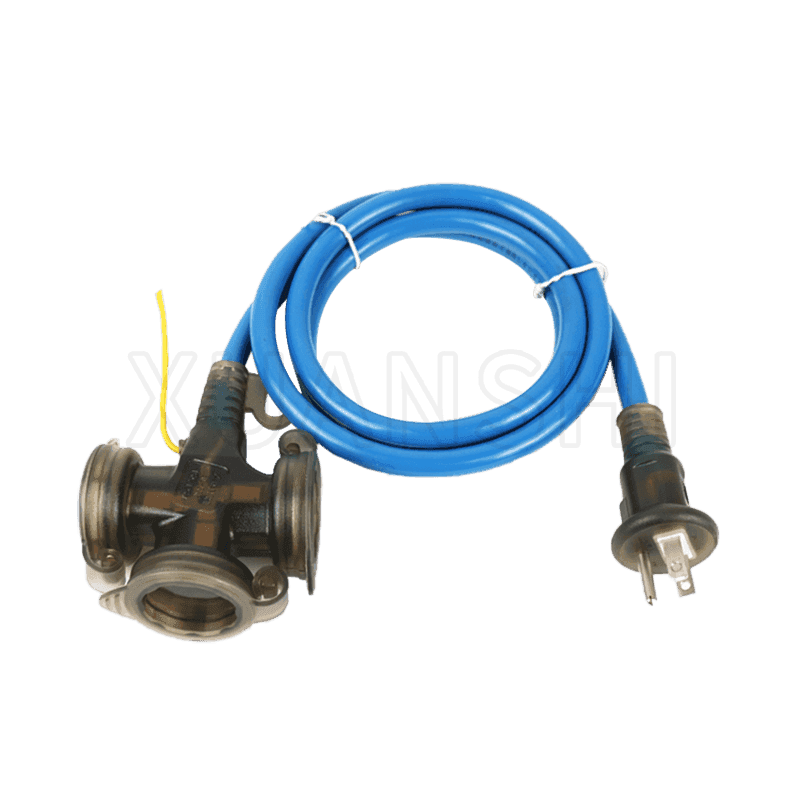The type of insulation used in a 3-pin plug power cord is typically made from materials like PVC (Polyvinyl Chloride), rubber, or TPE (Thermoplastic Elastomer). These materials are chosen for their durability, flexibility, and resistance to wear and tear.
Electrical Insulation: The insulation in a 3-pin plug power cord is fundamentally engineered to provide a high level of electrical isolation between the internal conductive wires and the external environment. Conductive wires, typically made of copper or aluminum, are designed to carry electrical current. Without adequate insulation, this current could inadvertently come into contact with the user, leading to dangerous electric shocks. The insulation acts as a dielectric barrier, ensuring that the electrical current remains confined within the conductive pathway. This barrier is crucial for maintaining the safety of the electrical system, as it prevents the current from straying into areas where it could cause harm. The insulating material must also exhibit excellent dielectric strength, which is the maximum electric field that the material can withstand without breaking down. High dielectric strength ensures that the insulation can resist electrical breakdown under high voltage conditions, further enhancing the safety of the power cord. This property is critical in preventing accidental contact with live electrical components and ensuring that the cord operates safely within its designated voltage range.
Heat Resistance: Heat generation is an inevitable byproduct of electrical current flow, especially when high power levels are involved. The insulating material used in a 3-pin plug power cord is selected for its ability to resist degradation due to heat. Common materials such as Polyvinyl Chloride (PVC), rubber, and Thermoplastic Elastomer (TPE) are chosen for their thermal stability. PVC, for instance, is widely used because it can withstand temperatures up to 105°C in normal operating conditions without melting or deforming. This heat resistance is crucial because if the insulation were to degrade or melt, it could expose the conductive wires, leading to electrical shorts or even fires. Heat-resistant insulation helps to maintain the cord’s flexibility over time, ensuring that it does not become brittle and crack, which could also expose the internal wiring. The thermal stability of the insulation also contributes to the overall longevity of the power cord. By resisting heat-induced wear and tear, the insulation ensures that the power cord can be used safely for extended periods, even under conditions of continuous use or high current flow. This durability is essential for applications where reliability and safety are paramount, such as in industrial settings or with high-powered electrical devices.
Moisture Resistance: Electrical safety is significantly compromised in the presence of moisture. Water, being a good conductor of electricity, can cause short circuits if it penetrates the insulation and reaches the conductive wires. The insulation in a 3-pin plug power cord is designed to be moisture-resistant, ensuring that it can safely be used in environments where exposure to water, humidity, or other liquids is likely. Moisture resistance is achieved through the use of hydrophobic materials in the insulation. These materials repel water and prevent it from seeping through the insulation and coming into contact with the conductive wires. In addition to protecting against direct water exposure, moisture-resistant insulation also prevents the accumulation of condensation inside the cord, which can occur when the cord is moved between environments with varying temperatures and humidity levels. This feature is particularly important for outdoor use or in locations where the power cord may be exposed to rain, splashes, or other sources of moisture. The insulation must maintain its integrity in such conditions to prevent dangerous electrical faults. Moisture resistance also contributes to the overall durability of the power cord, reducing the risk of electrical failure due to environmental factors and extending the lifespan of the cord.
Japan 3 pin plug extension cord with 3 outlet socket JL-55A,JL-55F
